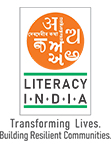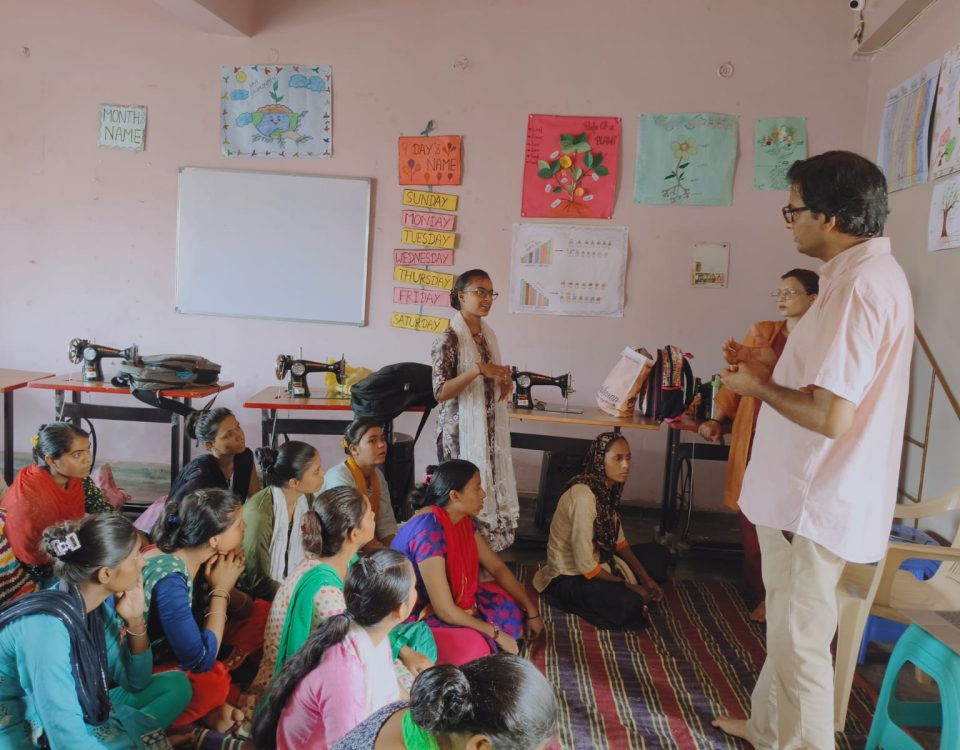Girl Power | Celebrating 25 Years

Joy of Giving
May 30, 2022
Happy Literacy Day
May 31, 2022Though Joy of Giving week has just got over, there is another Joy to celebrate that is World Girl Child’s Day and then another one that is Literacy India completing 25 Years, committed to this cause with a reach to over 7,00,000 across the nation since 1996.
While in Pursuit of our goals last two decades, Literacy India never forgot about gender equality. All our work is committed towards upliftment, and more than 60% of community members comprise Girl Child, Young Girls and Women. We owe our success due to their overwhelming response.
This Navratri Goddess Durga reminds us to continue our mission. We wish all our Friends and Well-wishers Happiness and Peace.
Literacy India was set up in 1996 by Capt. Indraani Singh, to educate underprivileged women and children and empowering them to become self-reliant and employable.
Our 4E’s:
Education, Empowerment, Employment &Environment
- With the 3E’s forming the core of what we do, we strive to induce education at the forefront, imbibe a variety of vocational skills and reach out to the underprivileged across India.
- Nurture, mentor and assist children and youth in becoming assets to their community through a holistic learning approach.
- Restore dignity amongst the underprivileged. Empower youth and women from rural & economically underserved communities.
- Transforming the educational landscape through innovative methods and providing a broader exposure canvas in a socio-cultural environment. An encouraging environment where one is provided with an opportunity to build their personality and be given a chance to hone their skills.
- Evolving to 4rth E that is Educating our beneficiaries and using best practices for saving our Environment

Literacy India opened a centre in Bijwasan, once a village, in Delhi, especially for the Girls, in 2007. Over 5000 girls from nearby Government schools grew up with the support of this centre in different walks of life. Over the Years, various companies have supported this centre, starting from Maruti, Accenture, Deloitte, Dell Technologies and Orange. With their support, the centre was also open to employee engagement, thereby giving the girls massive exposure to the outside world.
Bijawasan has a population of over 25000 migrant communities from Bihar, UP, MP and Rajasthan.
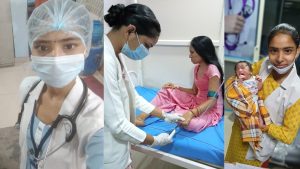
Chanda,25, grew up in this centre since she was 12. She was shy and had low esteem, struggled with her grades in school. She lost her father when she was pretty small, mother works as a maid. Going to the centre gave her courage and confidence. Her resilient nature evolved this girl. She learnt everything whatever the skills centre offered her besides academic support. She wanted to help her mother, who had to take care of her and her younger brother. She learnt to stitch and start doing odd jobs. However, as soon as she completed her Class XIIth, she enrolled herself on a computer application course and worked as a computer intern for a year at the centre to hone her IT skill.
Soon she managed to find work in a nearby hospital as a Receptionist with her first salary of 8000 per month. While in Hospital, she realised there were more job opportunities; therefore, she decided and completed a Nursing course with her own earnings and became a Nurse. Now she is earning 15000 per month at Sargam Health Care Hospital, Samalkha, Delhi.
Chanda is now confident, proud and living her dream as an independent and empowered woman. Her commitment to become yet another pillar of strength for her mother. It’s all about Girl Power !
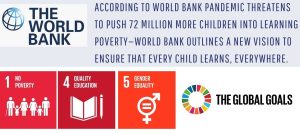
The pandemic is amplifying the global learning crisis that already existed: it could increase the percentage of primary-school-age children in low- and middle-income countries living in learning poverty to 63 percent from 53 percent, and it puts this generation of students at risk of losing about $10 trillion in future lifetime earnings, an amount equivalent to almost 10 percent of global GDP.
The new report, Realising the Future of Learning: From Learning Poverty to Learning for Everyone, Everywhere, lays out a vision for the future of learning that can guide countries today in their investments and policy reforms, so that they can build more equitable, effective, and resilient education systems and ensure that all children learn with joy, rigor, and purpose in school and beyond the school walls.
The accompanying report, Reimagining Human Connections: Technology & Innovation at the World Bank, presents the World Bank’s new approach to guide investments in education technology, so that technology can truly serve as a tool to make education systems more resilient to catastrophic shocks like COVID-19 and help in reimagining the way education is delivered.

Due to several Lockdowns across the country, Literacy India took steps to move into online learning for the children of our centres and our adopted govt schools. It was tough going for the children. On the one hand, there was this Fatal illness, and on the other, communities struggling to survive due to loss of livelihood. Child Labour, Child trafficking and early marriages of young girls have been on the rise.
Literacy India has adopted RRCamp Govt School in Gurgaon and motivated 50 students to enrol in our Gyantantra Digital Education program. There still a challenge of Android Phones, Tab or Laptops for many children.
The Students who enrolled under the GDD project come from low-income communities who migrated from Bihar, UP, MP and other states. Majority of them are 1st generation learner who parents have never had the opportunity to access quality education.
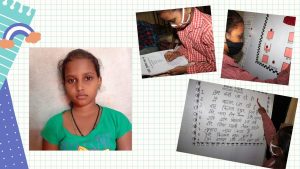
Gunnaj is one of the girl children who come from an impoverished family. Due to covid when schools were closed, Gunnaj didn’t have an android phone. She was out of school, so she was mobilised during the survey to join the program. Her father was counselled to buy the Mobile phone, so she could continue her academics. This overall, counselling was a daunting task for the Literacy India Coordinator. Family members were angry and upset initially, and they refused to enrol Gunnaj into the program Perseverance paid off eventually. Gunnaj was given a phone to study.
Now Gunnaj understands all academic videos contents. She can access shared topics and worksheets sent to her and attends the online lessons regularly, owing to the teacher’s supervision. She pays attention in class and expresses her doubts right away. She has improved her language and arithmetic skills due to her regular classes.
In her Family, where ignorance ruled, Gunnaj aspires to be a doctor to serve the underprivileged by providing free medical care. We believe that thousands of such girls could be given such opportunities, and they can walk into the threshold of dreams. These dreams later become realities for many we have seen in society.
